To renowned French Chef Sakal Phoeung, the most important factor in opening and maintaining a successful restaurant anywhere in the world is the right balance of hardware and software.
In
other words, the right people to work in the right space. With its market for
Western cuisine rapidly growing, pushing competition and increasing the need
for quality food and service, this was never more applicable to Vietnam’s
economic hub Saigon. We spoke to Sakal Phoeung about his experience in Asia as
one of the top, executive Chefs in the region for over 15 years to gain some
insight into the key to success in Ho Chi Minh City’s ever-greater market for
fine, international cuisine.
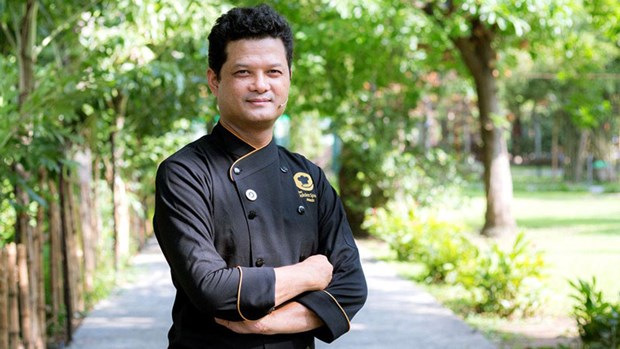
Image source: goldenspoonawards.com
What
brought you to Southeast Asia?
I
have been in Asia since 2000, first coming to Vietnam in 2000 with 5-star hotel
chain Sofitel as the Executive Chef for their Saigon hotel. Between 2000 and
2012, I moved around the region working for Sofitel, first in China (Beijjing)
for two-and-a-half years and back to Southeast Asia in 2010 to open a new
branch for the brand in Phnom Penh. I came back to Saigon in 2012 and worked
there until early March 2016 when I realised that I wanted something more. I
had always dreamed to be an executive chef in a 5-star hotel, and now that I
had done it for so long I wanted a new challenge. So I left, and I opened my
own restaurant here in Saigon called Le Corto.
You
have a lot of experience working in some of the best restaurants in Asia. What
do you think is the key to opening and maintaining a successful restaurant
here?
You
have to think of the software. The staff. People who open a restaurant here
invest so much in creating a beautiful decor, but they don’t think as much
about investing in good staff. You cannot deliver low quality food in HCMC
anymore because the people know what fine food is, so it is so important to get
a good manager and chef. No matter what your restaurant looks like, without a
good manager and chef you cannot be successful!
So
staff is very important. What is the key to finding good, quality staff for
your restaurant?
There
are schools in this city that turn out good quality staff, such as Vattel, but
really the most valuable thing to look for is experience. I started work at 18,
but my first position as a chef was at 30. You cannot hire a youngster and
expect a wise man’s work. Owners here often hire younger, less experienced
staff because they are cheaper, but at the end of the day it costs them more!
Another option is to hire someone who is totally new to the job and train him.
About 10 years ago a young guy came to me to ask for a job. He was a security
guard at Ben Thanh Market at the time! Anyway, I trained him and he worked
hard, he learned quickly, and now he is the Assistant Chef at the Caravelle
Saigon.
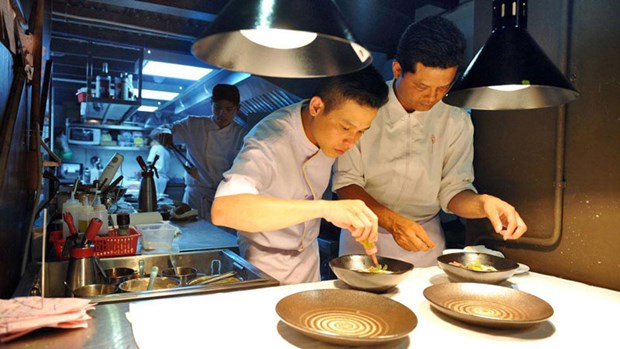
Image source: www.lecorto.com
In
general, what are the main challenges in working with VN cooking staff?
The
main challenge is language – communication. But actually in the kitchen we
speak a limited number of words – about technique, ingredients, etc – so
eventually everyone understands. In France the workers are workers and the
chefs are chefs, but here in Vietnam chefs are more like teachers with
students. And the Vietnamese are great students – they want to learn, are
ambitious, and eager to participate. When I worked in China the attitude of my
staff was not motivated – they had everything at home, mum and dad cooked for
them and looked after them, so why should they work? And in Cambodia my staff
lacked discipline. But the Vietnamese have something.
How
do you retain your staff long-term?
I
give them a dream. Of course my staff always wants to learn new skills, so I
teach them and I give them opportunities to move up and improve, because if you
show someone that he can do something if he works, he will be inspired to work
hard. As a chef I never hide my experience, my recipes, my knowledge – I like
to share it and help others to learn.
Can
you break down the average salaries for respective positions in a high quality,
Western restaurant in Saigon?
The
basic starting salary is about VND 5 million per month, and Chef De Partie can
earn about VND 10 million. It takes a minimum of four years to really progress
from beginner to Chef De Partie, if you want to do your job well, and to become
a Chef it can take up to 10 years. The Chef here earns between VND 40-50
million per month, and as quality Pastry Chefs or Bakers are hard to find they
can also earn up to VND 50 million. An experienced English speaking waiter can
earn between VND 6-10 million per month, plus tips.
How
do you make sure quality is maintained in the products you use to make your
food?
Well
there are official government-set standards for hygiene and quality of food –
of course! But the difficulty is in enforcing them. They come to inspect
kitchens often, especially in 5-star hotels, but they never look at our
processes, products, working environment, etc. 100%, from the supplier to the
kitchen. Actually I remember one time I was on my way to work and I followed a
guy on a motorbike with a big crate of frozen vegetables on the back, melting,
wet, and I bet you by the time that food got to its destination it was warm.
When I worked in Sofitel we imported our bread and honestly it was hard to get
it to arrive at the restaurant above 15 degrees.
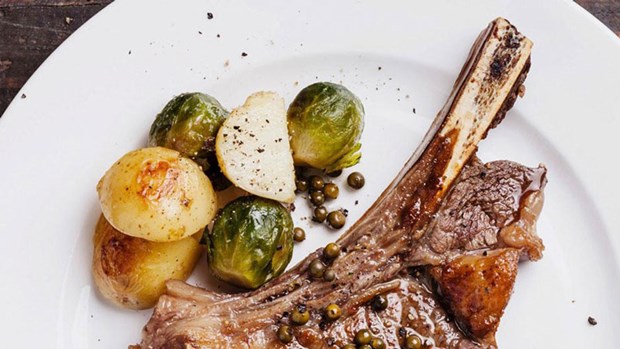
Image source: www.lecorto.com
Is
it hard to find some of the essential elements in the food you cook here?
Despite
what you might think, it has become harder to source ingredients since I came
here in 2000. You need a whole load of licenses to sell now, which cost money,
so suppliers are often reluctant to work with places unless they will be
ordering large enough amounts. But in the end it’s not so much the quantity or
availability of the products that is an issue – it is the quality. I import all
my meat because the animals here are so skinny, and the quality of their meat
is so low. Also, though vegetables are widely available here their flavour is
just not as good as in Europe. It’s a hot country, and the produce grows too
quickly.
Who
are the main players for good food imports to HCMC at the moment?
Well
Classic Fine Foods has been here for a long time, and is still a key contender.
At the beginning they had very high prices because there was no competition!
But now a number of good suppliers have popped up – Annam, New Viet Dairy, etc.
There really is a lot of choice, and because of that the prices have dropped.
What
is the ideal ratio between rent cost and overall profit for a restaurant in
Saigon’s D1?
The
cost of rent does depend on where you are, but D1 is generally expensive. You
should make sure that costs are not over 8-15% of your overall earnings. So if
you rent an expensive property you’ve got to be prepared to generate some
pretty amazing business! The general rule of thumb is to allocate 18% of profit
for staff salaries, 15% for rent and about 32-35% for food costs. At the end
you only make 32% profit – so you’d better make it count.
Competition
is rising for quality international cuisines here in HCMC. Because of this, how
sustainable is the restaurant business here?
Very
– I estimate that we’ve only reached about 40% of the possible capacity that
Saigon has for good, international food. We have about 10-15 years more
potential for growth. Today no-one can get a two star Michelin rating – they
can cook the food, but not to that quality. More people are becoming richer and
more globally aware, so the demand goes up. I think that the general attitude
here is geared towards even more global integration – people want to learn
about foreign ways of life – not like China, for example, where people are less
open minded.
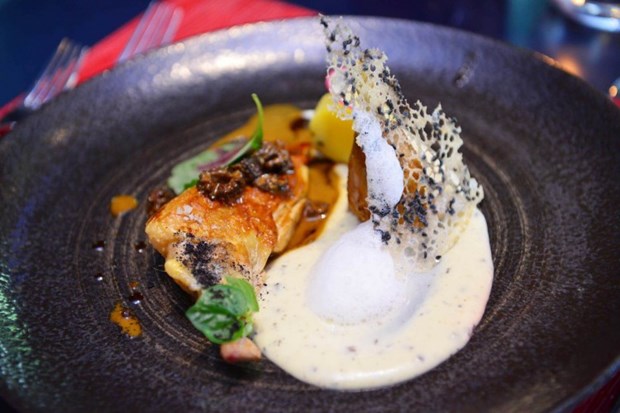
Image source: www.lecorto.com
I’ve
heard that property owners here in Vietnam often break a lease before the
contract ends – Why do they do so? And is there anything you can do to avoid
this?
No
there is nothing you can do at all – it’s a game, a matter of luck! They have
absolutely no law for that kind of thing, I think. In Vietnam people are so
business minded – in here it is a systematic thing – if you are doing good
business why would they let you do it? Property owners will rent you their
space, but as soon as your business is going well they may just kick you out
and try to run that business themselves! What they don’t realise is that they
are missing the software – the staff – so it rarely ever works. A while back, I
opened a bakery here called Bon Appetite and after one year the owner sold the
building. I had to move all my equipment – everything – and in the end I didn’t
make any profit anymore, so the business ended. It was just bad luck.
In
the past there was no VAT, no service tax, but now some places even charge
7-10%! Does this money always go to the workers?
Supposedly,
I mean it should. In my experience the Vietnamese owners often don’t give the
service charges to their staff members. Maybe they don’t know what the service
tax is, or maybe they just don’t want to know. That’s why the staff ask for a
good, already quite high salary when they apply for a job – because they can’t
guarantee tips. VND 3.7 million is basic salary, after service charge more –
sometimes VND 5 million per month. Local staff ask minimum 4-4.5 million. For
the hotel it is standard.
You
are an expert in a number of cuisines. What is your opinion of Vietnamese food?
Well,
though I love the food as a food, it is not yet a gastronomy. The evolution of
Vietnam’s food has been slow because they were not integrated into the world
early on like Europe and the rest of the West, so no one has developed it as a
fine food – it is still unrefined. That being said, Vietnamese food is one of
the best in the world – light, a little bit spicy, easy to eat, plenty of herbs
and fresh vegetables – it’s not like Chinese food with its heavy, fatty sauces
and strange flavours. It can be adapted to any dietary preference or taste. But
how to present Vietnamese food as a gastronomy cuisine? It is difficult.
Vietnamese chefs have thought about it, but their cuisine is like a garden on a
table, lots of herbs, so to condense it into a small, compact dish on the table
is very hard. They bring out beautiful products with lovely presentation, but
missing flavour. It is a process, you need time.
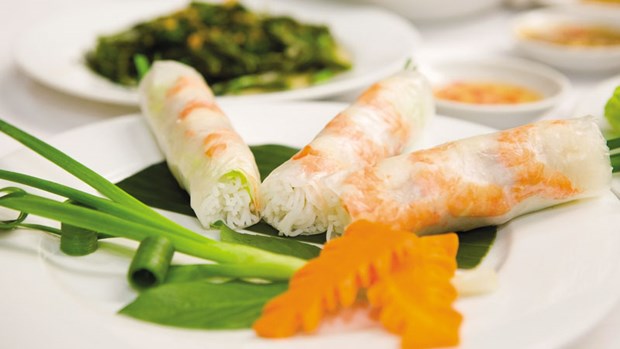
Image source: www.lecorto.com
Do
you have a favourite restaurant in HCMC?
I
cannot say! I love to eat in the street. My favourite street food is a chicken
place near the Bitexco Tower, and I sometimes go to D4 for a really delicious
crab dish in one of the alleyways near Hoang Dieu. In Vietnamese food there is
a special sauce for each dish. You never see that anywhere else – in Thailand
they have chili sauce, in China they have fish sauce – it is so carefully and
specifically done. And I would say that the best Vietnamese food is definitely
on the street, because they focus on only one product and make it really well.
So
is Vietnamese food an essential element of the Vietnamese travel experience?
Absolutely.
People come here to visit what? Country, culture, attractions, landscape, yes,
but the main thing is the food. They often only come one time, not two, because
there aren’t HUGE attractions like the pyramids in Egypt, etc. They come for
the food.
What
is your main piece of advice for a young chef looking for a job in Saigon?
Go
to a 5-star hotel first to learn with a good team in a good environment, or a
big company. Don’t think about salary. Learn and make your way up the ladder,
then when you have experience you can have your pick of the best salaries. If
you make the mistake to go to a different restaurant with a higher salary but
offering limited experience, what do you learn at the end of it? Money is like
water – you use it, and it is gone.
By Vietnamese
Food Lovers
Source: http://vietnamesefoodlovers.org/chefs/interview-with-sakal-phoeung-of-le-corto-restaurant/